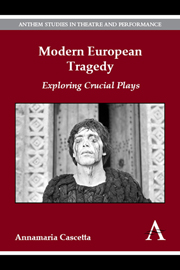Book contents
- Frontmatter
- Dedication
- Contents
- Acknowledgements
- Introduction: The Tragic, Tragedy and the Idea of the Limit
- Chapter 1 Hubris and Guilt: Gengangere (Ghosts)
- Chapter 2 Eve Becomes Mary: L'annonce faite à Marie (The Tidings Brought to Mary)
- Chapter 3 The School of Hatred: Mourning Becomes Electra
- Chapter 4 The Destiny of Man Is Man: Mutter Courage und ihre Kinder (Mother Courage and Her Children)
- Chapter 5 The Tragic and the Absurd: Caligula
- Chapter 6 Dianoetic Laughter in Tragedy: Accepting Finitude: Endgame
- Chapter 7 The Arrogance of Reason and the ‘Disappearance of the Fireflies’: Pilade (Pylades)
- Chapter 8 The Apocalypse of a Civilization: From Akropolis to Apocalypsis cum figuris
- A Provisional Epilogue: Between the Experience and the Representation of the Tragic: Towards a Performative Theatre
- Appendix: Chronology of Productions
- Notes
- Index
Chapter 1 - Hubris and Guilt: Gengangere (Ghosts)
Published online by Cambridge University Press: 05 September 2014
- Frontmatter
- Dedication
- Contents
- Acknowledgements
- Introduction: The Tragic, Tragedy and the Idea of the Limit
- Chapter 1 Hubris and Guilt: Gengangere (Ghosts)
- Chapter 2 Eve Becomes Mary: L'annonce faite à Marie (The Tidings Brought to Mary)
- Chapter 3 The School of Hatred: Mourning Becomes Electra
- Chapter 4 The Destiny of Man Is Man: Mutter Courage und ihre Kinder (Mother Courage and Her Children)
- Chapter 5 The Tragic and the Absurd: Caligula
- Chapter 6 Dianoetic Laughter in Tragedy: Accepting Finitude: Endgame
- Chapter 7 The Arrogance of Reason and the ‘Disappearance of the Fireflies’: Pilade (Pylades)
- Chapter 8 The Apocalypse of a Civilization: From Akropolis to Apocalypsis cum figuris
- A Provisional Epilogue: Between the Experience and the Representation of the Tragic: Towards a Performative Theatre
- Appendix: Chronology of Productions
- Notes
- Index
Summary
Janus bifrons
It makes sense to begin with Ibsen's play, though written in the nineteenth century, if we consider that it dates from a period of momentous transition.
Chamberlain Alving and Oswald Alving, the true tragic characters in the play, are like a diptych, a Janus bifrons, with one looking back at the nineteenth century and the other forward to the fin de siècle crisis that ushered in the new century. Chamberlain Alving's gaze is fixed on the idea of the omnipotence of the self and he acts accordingly, in keeping with an irrepressible, culpable hubris, whose self-destructive and other-destructive consequences fall on himself and his son. Oswald's gaze is focused on the revelation of deceit, omnipotence and the absolute domination of the ego. He sees the biological and psychological ‘humiliations’ of the self, which believed it was master in its own house, and its coming defeat, though only after the lapse of a generation. In the former the Romantic, positivist ethos is at work; and in the latter the lurking disquiet to which Darwin and Freud were to give a systematic order. Then followed the currents of thought of the new century, which was shaken and maimed by the blow which war inflicted on the presumption and arrogance of Western man.
- Type
- Chapter
- Information
- Modern European TragedyExploring Crucial Plays, pp. 15 - 30Publisher: Anthem PressPrint publication year: 2014



